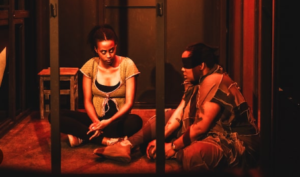By Stephen Weir
We are witnessing a transformative period in Toronto’s theatre scene. Seasoned Caribbean Canadian actors and actresses secure roles in stage plays, often requiring them to adopt African accents at the Soulpepper Theatre. Just last week at the Tarragon Theatre, a Governor General prize-winning playwright, originally from the Grenadines, debuted a pair of plays centered around two female African prisoners and three African guards during a civil war that Canadians have long forgotten or never knew about.

Over the weekend, the Tarragon Theatre concluded its short run of playwright Donna-Michelle St. Bernard’s “3 Finger’s Back.” The three-hour play, performed in the Tarragon’s 108-seat theatre, consists of two separate plays set in an African prison during the 1975 Angola civil war, as part of her larger project exploring the countries of the African continent.
In “Give It Up,” two female prisoners (Uche Ama and Megan Legesse) are depicted onstage in a large clear plastic box. They occupy a chair and a bowl, alternating between sitting, lying, and standing, awaiting the arrival of a soldier to take one of them away for torture. While no violence is portrayed onstage, the effects of Uche Ama’s progressive physical deterioration are evident as she is carried back to her prison more battered and bruised. The play leaves audiences questioning the events unfolding before them.

Following an intermission featuring a folk singer and equine-inspired cocktails, the second Bernard play, “The Smell of Horses,” starred Christopher Bautista, Indrit Kasapi, and Tsholo Khalema. Despite the title, horses do not appear onstage; instead, the same set is inhabited by three prison guards grappling with the complexities of their roles in the Civil War. Though they continue their brutal acts off-stage, including torture, rape, and murder, the play concludes leaving the audience contemplating the fate of both captives and captors, as well as the broader implications for the African continent.
Meanwhile, during the same weekend as the conclusion of Bernard’s plays, a groundbreaking fusion of classic Russian drama and Nigerian history unfolded. Chekhov’s renowned Russian family comedy, “Three Sisters,” was transported to Nigeria in an innovative production presented by Soulpepper and Obsidian Theatres. This unique adaptation, set against the backdrop of the Biafran War, drew sold-out crowds throughout its month-long run at the downtown Soulpepper Theatre.

The concurrent staging of three plays exploring the horrors of war in Africa by two theatres underscores a dynamic and evolving theatre scene in Toronto. Founded in 2000 by members of the Caribbean community, the Obsidian Theatre initially focused on narratives of the Caribbean experience in Canada. With the retirement of longtime artistic director Phillip Akin in 2020, Mumbi Tindyebwa Otu has expanded their repertoire, often collaborating with Soulpepper Theatre on new proects. Meanwhile, at the Tarragon Theatre, formerly synonymous with Contemporary White Canadian theatre, former Black Theatre Workshop artistic director Mike Payette is now in charge and he has widened the range of productions showcased in the Casa Loma district theatre.


